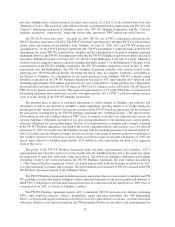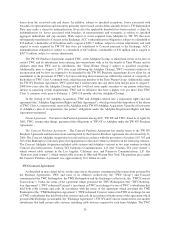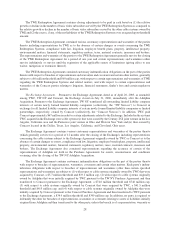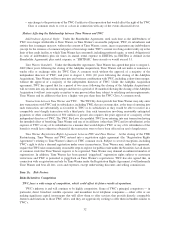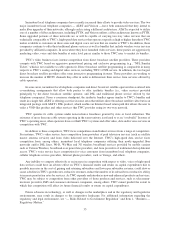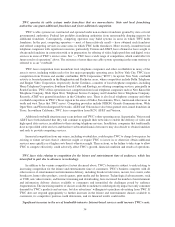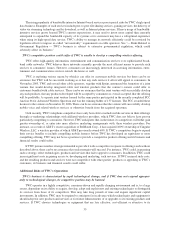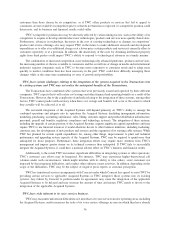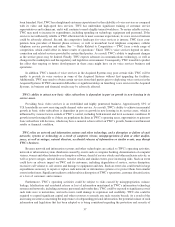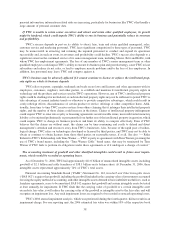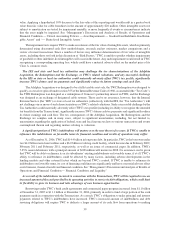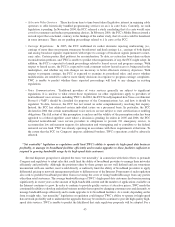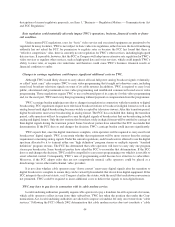Time Warner Cable 2006 Annual Report Download - page 39
Download and view the complete annual report
Please find page 39 of the 2006 Time Warner Cable annual report below. You can navigate through the pages in the report by either clicking on the pages listed below, or by using the keyword search tool below to find specific information within the annual report.TWC operates its cable systems under franchises that are non-exclusive. State and local franchising
authorities can grant additional franchises and foster additional competition.
TWC’s cable systems are constructed and operated under non-exclusive franchises granted by state or local
governmental authorities. Federal law prohibits franchising authorities from unreasonably denying requests for
additional franchises. Consequently, competing operators may build systems in areas in which TWC holds
franchises. In the past, competing operators — most of them relatively small — have obtained such franchises
and offered competing services in some areas in which TWC holds franchises. More recently, incumbent local
telephone companies with significant resources, particularly Verizon and AT&T, have obtained or have sought to
obtain such franchises in connection with or in preparation for offering of video, high speed data and digital voice
services in some of TWC’s service areas. See “— TWC faces a wide range of competition, which could affect its
future results of operations” above. The existence of more than one cable system operating in the same territory is
referred to as an “overbuild.”
TWC faces competition from incumbent local telephone companies and other overbuilders in many of the
areas it serves, including within each of its five major geographic operating areas. In New York City, TWC faces
competition from Verizon and another overbuilder, RCN Corporation (“RCN”). In upstate New York, overbuild
activity is focused primarily in the Binghamton and Rochester areas, where competitors include Delhi Telephone
and Empire Video Corporation, respectively. In the Carolinas, a number of local telephone companies, including
Horry Telephone Cooperative, Southern Coastal Cable and Knology, are offering competing services, principally in
South Carolina. TWC’s Ohio operations face competition from local telephone companies such as New Knoxville
Telephone Company, Wide Open West, Telephone Service Company and Columbus Grove Telephone Company.
Recently, AT&T was granted franchises in the Columbus area. There is also local telephone company and other
overbuild competition in TWC’s Texas region in the areas of Dallas, San Antonio, Waco, Austin and other areas in
south and west Texas that TWC serves. Competing providers include FISION, Grande Communications, Wide
Open West, and Western Integrated Networks. AT&T and Verizon have also been granted state-issued franchises in
Texas. In southern California, TWC faces competition from RCN, AT&T and Verizon.
Additional overbuild situations may occur in these and TWC’s other operating areas. In particular, Verizon and
AT&T have both indicated that they will continue to upgrade their networks to enable the delivery of video and
high-speed data services, in addition to their existing telephone services. In addition, companies that traditionally
have not provided cable services and that have substantial financial resources may also decide to obtain franchises
and seek to provide competing services.
Increased competition from any source, including overbuilders, could require TWC to charge lower prices for
existing or future services than it otherwise might or require TWC to invest in or otherwise obtain additional
services more quickly or at higher costs than it otherwise might. These actions, or the failure to take steps to allow
TWC to compete effectively, could adversely affect TWC’s growth, financial condition and results of operations.
TWC faces risks relating to competition for the leisure and entertainment time of audiences, which has
intensified in part due to advances in technology.
In addition to the various competitive factors discussed above, TWC’s business is subject to risks relating to
increasing competition for the leisure and entertainment time of consumers. TWC’s business competes with all
other sources of entertainment and information delivery, including broadcast television, movies, live events, radio
broadcasts, home video products, console games, print media and the Internet. Technological advancements, such
as VOD, new video formats, and Internet streaming and downloading, have increased the number of entertainment
and information delivery choices available to consumers and intensified the challenges posed by audience
fragmentation. The increasing number of choices available to audiences could negatively impact not only consumer
demand for TWC’s products and services, but also advertisers’ willingness to purchase advertising from TWC. If
TWC does not respond appropriately to further increases in the leisure and entertainment choices available to
consumers, its competitive position could deteriorate, and its financial results could suffer.
Significant increases in the use of bandwidth-intensive Internet-based services could increase TWC’s costs.
34



